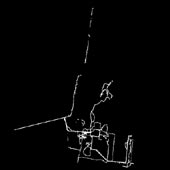Locative Media Workshop

In July 2003 an international gathering of artists and researchers for an exploration of ideas around mobile communications and location-specific media met at Karosta - Latvia's former Soviet "War Port". This "Locative Media Workshop" aimed to explore how wireless networking impacts upon notions of space time and social organization. The 10 day workshop was an open space/time for experimentation.
Karosta is an extraordinary remnant of the Soviet occupation of Latvia on the edge of the town Liepaja on the Baltic coast. From being a military base housing 25,000 people, the landscape is now mostly ruins. A community of 6000 people, mostly Russian speaking and stateless: carrying either old Soviet documents or Lativan issued so-called "alien passports", still live there amid dereliction and mass unemployment. After having set up some temporary arts workshops there, documentary film-makers Kristine Briede & Carl Biorsmark began making a film on Karosta. But the experience inspired them to step through the screen and "become documentary social workers". The auguration of their K@2 Culture and Information Centre was in December 2000. Since its inauguration K@2 has collaborated on several projects with the Rixc Centre in Riga, Latvia, an organisation dedicated to developing media, communication and youth culture projects, networks and outlets through performances, conferences, projects and net-radio broadcasts.
In this location - so determined by the changing maps of power and military technology - the researchers utilised new and old technologies such as GPS (Global Positioning System) devices, wireless internet connections and low power radio transmitters to create networks and information gathering systems. Visualisation and meta-data applications were used to display, store and interconnect information. The objective was to create an online map interface by which the local public could access and author the geo-annotated space of Karosta. Local stories were woven together in conceptual framework of local sites, sounds and stories and the visitors, guided by local residents, ventured throughout Karosta collecting media samples of the environment and creating annotations with GPS receivers.
"Inexpensive receivers for global positioning satellites have given amateurs the means to produce their own cartographic information with military precision. This user-generated cartographic data has recently begun to be shared in a variety of networking machine-searchable environments, which is enabling the development of an 'open source' data pool of human geography. With the arrival of portable, location-aware networked computing devices this "collaborative cartography" will permit users to map their physical environments with geo annotated, digital data. As opposed to the World Wide Web the focus here is spatially localized, and centred on the individual user; a collaborative cartography of space and mind, places and the connections between them." Marc Tuters
LH


